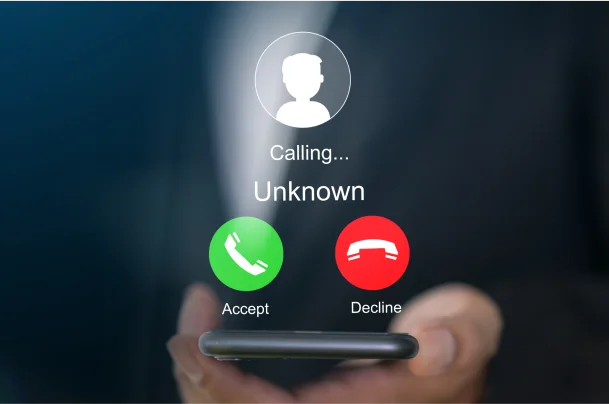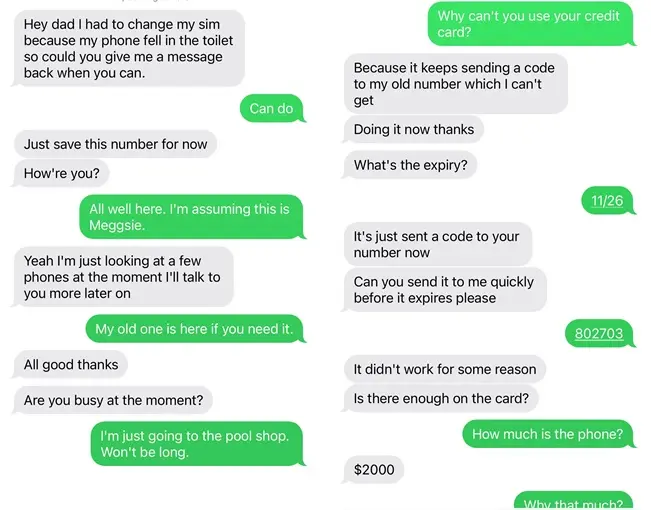Oct - Dec 2024
Romance scam

Watch out - Be aware of scammers exploiting dating or friendship to gain your trust and steal your money. Never assume someone you’ve only met online is who they claim to be. Scammers will go to great lengths to make the relationship seem real, manipulating you into giving them money.
These scammers use social media, dating and gaming apps, or websites to find you. They may also reach out via SMS or email. Hiding behind fake profiles and identities (even posing as celebrities), they’re experts at making you feel the relationship is genuine.
Once they have your trust, they will fabricate an 'emergency' and ask for money or products to help them. They may also request you to set up accounts or transfer money for them. Scammers are patient and can spend years building this trust.
Remember - Scammers will quickly express strong feelings, so the relationship progresses quickly because you feel special right away. If you're chatting on your usual social media platform or an official dating service, they’ll try to move the conversation to another platform, like WhatsApp.
Romance scammers encourage secrecy and push you to trust only them, often attempting to isolate you from family and friends. There will always be an excuse for why they can’t meet in person or appear on camera, such as living overseas, being in a remote location, or having malfunctioning technology.
Other warning signs include:
- Their online profile doesn’t align with what they tell you about themselves.
- They discuss money or investments, possibly claiming to know about cryptocurrency and offering to teach you.
- They ask for personal photos, videos, or information that could be used against you in the future.
- The scammer becomes desperate or angry if you don’t comply with their requests, and they may threaten to end the relationship.
- Never send or transfer money to someone you haven’t met in person.
- Verify the person's identity to ensure they are who they claim to be.
- Be cautious about what personal information you share.
Latitude Impersonation Phone Scam

Watch out - we've received various reports of calls claiming to be from Latitude asking customers to authorise a transaction or a refund on their account. Calls often appear to be a recorded message, but it can also be a cold call, posing as the Latitude Fraud Dept. This scam has also been delivered via SMS with a number to call to ‘confirm’ the transaction.
If you respond to the recorded message or contact the number provided in the SMS, you may speak with a scammer who will attempt to trick you into following instructions (e.g. Refunding an unauthorised purchase) to steal your money or personal details.
Remember – Latitude will never ask you to share sensitive banking details (password, PINs, or one-time passcode for payment) in an email or SMS. We’ll never ask you to log into your account by clicking a link or request remote access to your computer or device, or transfer money to another account.
Protecting yourself
- Hang up on suspicious callers claiming to be from Latitude.
- Call Latitude using the number listed on our official website or on the back of your card to confirm whether a call or message is real. Don’t call the number provided in the message.
- If you receive a call from Latitude asking you to authorise anything, don’t do it!
Hi Mum/Dad scam
Have you ever received an unexpected text or chat message from someone claiming to be your child and asking for money? It may sound like an unlikely scenario, but it is quite a common type of scam known as the “Hi Mum/Dad” scam. This scam preys on people's emotions, often with devastating results.
Watch out - The Hi Mum/Dad scam is a fraudulent message sent via a messaging app or social media platforms such as Messenger, WhatsApp or Snapchat. The sender claims to be a distressed family member, pretending they have a new number because their phone was lost, broken or stolen. The sender may then say they are in trouble and ask to borrow money or make a payment on their behalf to help pay a bill. Whatever story they tell, the goal is always the same - to convince you to send them money as soon as possible.
These scammers use specific tactics to manipulate their victims into sending them money without question. They use personal details such as names, relationships, and locations that make the chat seem more real; they create a sense of urgency by telling their victims they must act immediately, and they often suggest ways that money can be sent quickly such as making an OSKO payment or buying gift cards. It is important to remember that no matter how convincing the story may sound, it is not real, and you should never send any money without verifying its authenticity first.
An example of the Mum/Dad scam targeting parents via WhatsApp or text messages.
 Remember – The best way to protect yourself from this scam is by being aware of it and educating yourself about how it works. If you receive a message like this, never give out any personal information or send any money before verifying the sender’s identity. Ask questions that only your loved one would know the answers to or contact other family members who might be able to verify if it is them on the other end of the line. It's also important to remember that no matter how desperate or convincing the messages may sound, never send money without verifying the identity first!
Remember – The best way to protect yourself from this scam is by being aware of it and educating yourself about how it works. If you receive a message like this, never give out any personal information or send any money before verifying the sender’s identity. Ask questions that only your loved one would know the answers to or contact other family members who might be able to verify if it is them on the other end of the line. It's also important to remember that no matter how desperate or convincing the messages may sound, never send money without verifying the identity first!
Protecting yourself
- Be suspicious when it comes to unexpected messages or requests for money—even if they come from someone you know and trust.
- Contact the family member directly using an alternative method, such as their known phone or email, to validate their request before taking any action!
- Always ask questions about who they are before giving out any personal information or sending any funds.
- Be sceptical if there is pressure for an immediate response.
- Never give out bank account information or credit card numbers over the phone
- Verify the story with other family members before responding.
- If you think something is wrong, trust your instincts—do not send any money!